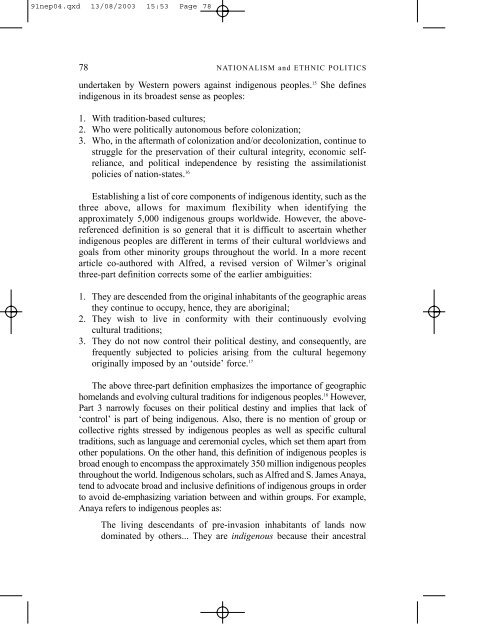Who is Indigenous? 'Peoplehood' and Ethnonationalist Approaches to Rearticulating Indigenous Identity
by Jeff J. Corntassel
by Jeff J. Corntassel
Create successful ePaper yourself
Turn your PDF publications into a flip-book with our unique Google optimized e-Paper software.
91nep04.qxd 13/08/2003 15:53 Page 78<br />
78 NATIONALISM <strong>and</strong> ETHNIC POLITICS<br />
undertaken by Western powers against indigenous peoples. 15 She defines<br />
indigenous in its broadest sense as peoples:<br />
1. With tradition-based cultures;<br />
2. <strong>Who</strong> were politically au<strong>to</strong>nomous before colonization;<br />
3. <strong>Who</strong>, in the aftermath of colonization <strong>and</strong>/or decolonization, continue <strong>to</strong><br />
struggle for the preservation of their cultural integrity, economic selfreliance,<br />
<strong>and</strong> political independence by res<strong>is</strong>ting the assimilation<strong>is</strong>t<br />
policies of nation-states. 16<br />
Establ<strong>is</strong>hing a l<strong>is</strong>t of core components of indigenous identity, such as the<br />
three above, allows for maximum flexibility when identifying the<br />
approximately 5,000 indigenous groups worldwide. However, the abovereferenced<br />
definition <strong>is</strong> so general that it <strong>is</strong> difficult <strong>to</strong> ascertain whether<br />
indigenous peoples are different in terms of their cultural worldviews <strong>and</strong><br />
goals from other minority groups throughout the world. In a more recent<br />
article co-authored with Alfred, a rev<strong>is</strong>ed version of Wilmer’s original<br />
three-part definition corrects some of the earlier ambiguities:<br />
1. They are descended from the original inhabitants of the geographic areas<br />
they continue <strong>to</strong> occupy, hence, they are aboriginal;<br />
2. They w<strong>is</strong>h <strong>to</strong> live in conformity with their continuously evolving<br />
cultural traditions;<br />
3. They do not now control their political destiny, <strong>and</strong> consequently, are<br />
frequently subjected <strong>to</strong> policies ar<strong>is</strong>ing from the cultural hegemony<br />
originally imposed by an ‘outside’ force. 17<br />
The above three-part definition emphasizes the importance of geographic<br />
homel<strong>and</strong>s <strong>and</strong> evolving cultural traditions for indigenous peoples. 18 However,<br />
Part 3 narrowly focuses on their political destiny <strong>and</strong> implies that lack of<br />
‘control’ <strong>is</strong> part of being indigenous. Also, there <strong>is</strong> no mention of group or<br />
collective rights stressed by indigenous peoples as well as specific cultural<br />
traditions, such as language <strong>and</strong> ceremonial cycles, which set them apart from<br />
other populations. On the other h<strong>and</strong>, th<strong>is</strong> definition of indigenous peoples <strong>is</strong><br />
broad enough <strong>to</strong> encompass the approximately 350 million indigenous peoples<br />
throughout the world. <strong>Indigenous</strong> scholars, such as Alfred <strong>and</strong> S. James Anaya,<br />
tend <strong>to</strong> advocate broad <strong>and</strong> inclusive definitions of indigenous groups in order<br />
<strong>to</strong> avoid de-emphasizing variation between <strong>and</strong> within groups. or example,<br />
Anaya refers <strong>to</strong> indigenous peoples as:<br />
The living descendants of pre-invasion inhabitants of l<strong>and</strong>s now<br />
dominated by others... They are indigenous because their ancestral


















